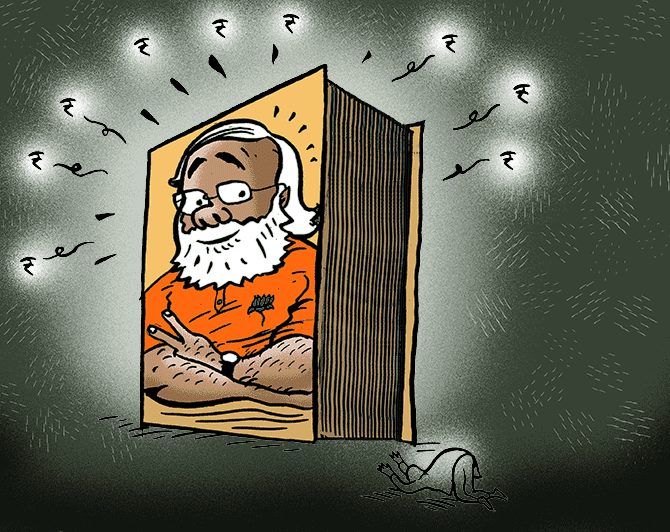'To suggest that our development dilemmas could be easily overcome would be naïve.
'But they also present opportunities -- for the rural economy, sustainable urbanisation and green industrialisation -- that could help India gain new competitive edge,' says Arunabha Ghosh.
Illustration: Dominic Xavier/Rediff.com

India’s development options are being shaped by dilemmas at home and monumental changes in the external environment.
Domestically, there is a seeming impossible trinity of jobs, growth and sustainability, where at best two out of three objectives get fulfilled.
For instance, solar parks attract international investment in sustainable infrastructure but do not create as many jobs as distributed energy infrastructure.
Scaling up natural farming is good for soil health, carbon retention and water conservation and is labour-intensive, but value addition in farm yields might not compensate for value loss in the fertiliser industry.
With its substantial share of India’s industrial output and millions employed in auto and auto ancillary industries, an aggressive move towards electric mobility is a big bet on emerging industries but will not be free of major trade-offs.
The external environment imposes further constraints on our choices.
There is planetary-scale damage to natural ecosystems via climate change, biodiversity loss and unbalanced bio-geochemical processes.
Deindustrialisation, low productivity growth and rising inequality have made the West turn its back on global integration.
There is weakened faith that market-driven growth can ensure social justice.
Disruptive technologies -- artificial intelligence, big data, automation, quantum computing, among others -- are engendering national rivalries and spawning mercantilist approaches to acquire or protect technologies.
And populism and nationalism in many countries are calling into question the bases of international order, with the stability of alliances, rules of diplomatic and military engagement, and the institutional structures needed to mediate conflict all under strain.
The confluence of an impossible trinity at home and natural, economic, technological and geopolitical disruptions globally raises at least seven major concerns.
Energy and resource security: The two are contingent on securing resources, safe passage, secure storage and functional international institutions.
Reducing imports of hydrocarbons, alone, will not suffice.
There will be new interdependencies, such as trade in clean energy products and services or supply of critical minerals for batteries, which will demand credible trade relationships, secure supply chains and effective multilateral institutions.
Economic and environmental diplomacy: India demonstrated climate leadership via the Paris Agreement.
It promoted the International Solar Alliance for cooperative energy security as the world undergoes an energy transition.
Next month, India will host parties to the UN Convention to Combat Desertification.
But these are episodic interventions. By 2022, when India hosts the G20 summit, it would need to integrate its interests on trade, finance and the economy with energy, climate and sustainability, setting a more consistent agenda for global governance.
Jobs and trade environment: The China-US trade war will continue to dampen global trade growth, so international trade will not be a big contributor to job growth for some time. India would have to turn even more to its domestic economy to create jobs.
The energy transition offers one of the best bets for new jobs in a slowing economy.
Climate risks and infrastructure investments: India’s growth is now intricately linked to climate risks.
Investments in hard infrastructure, such as housing, transport and industries, especially along the coasts, will be severely at risk.
With weather-related insurance losses mounting, already there are warning signs of climate change triggering the next financial crisis and the need for central banks to pay attention.
Border carbon adjustments and trade barriers: Trade disputes are plaguing clean energy, as countries scramble to grab their share of a growing market.
Disputes over climate and energy will increase.
By end-2019, the EU might get a deal for carbon neutrality by 2050.
Once finalised, it is only a matter of time before it imposes border carbon adjustment taxes to penalise imports arriving from countries deemed to be not acting fast enough on climate change.
The US, notwithstanding its weakened actions on climate change, could do the same.
China might argue that its emissions will peak well before 2030.
The resulting havoc in the global trading system would put acute pressure on India’s energy choices and development options.
Domestic populism and geopolitical risks: The backlash against growing inequality within advanced economies is already resulting in myopic populism.
Populist actions elsewhere could spill over into geopolitical risks for India in its Asian neighbourhood.
The Iran-US confrontation is one example, which impacts India’s energy security.
China-US tensions are triggering other reactions, such as China’s threats to cut-off rare earths supplies.
Such examples of what scholars have called “weaponised interdependence” make it harder for India to navigate technological cooperation with other countries, enact strategic industrial policy and attract investment.
Perfect storm of shocks: In 2008, there was not just the global financial crisis but also a global food crisis.
High energy prices, high-cost fertilisers, diversion of cereals to biofuels, declining food stocks, currency devaluations and adverse weather conditions led to rapid increase in food prices.
India must prepare for a perfect storm of global shocks in future, involving water stress, agricultural losses, tensions over energy supplies, growing trade disputes, extreme weather events bankrupting insurance firms and financial institutions, and mass movement of environmentally-displaced people.
A large-scale climate geoengineering experiment, say injecting sulphate particles into the stratosphere, could result in unanticipated consequences for precipitation, agriculture or biodiversity -- and could trigger political conflict in a completely ungoverned area.
To suggest that our development dilemmas could be easily overcome would be naïve.
But they also present opportunities -- for the rural economy, sustainable urbanisation and green industrialisation -- that could help India gain new competitive edge.
Time to make hard choices.
Arunabha Ghosh is CEO, Council on Energy, Environment and Water.













 © 2025
© 2025